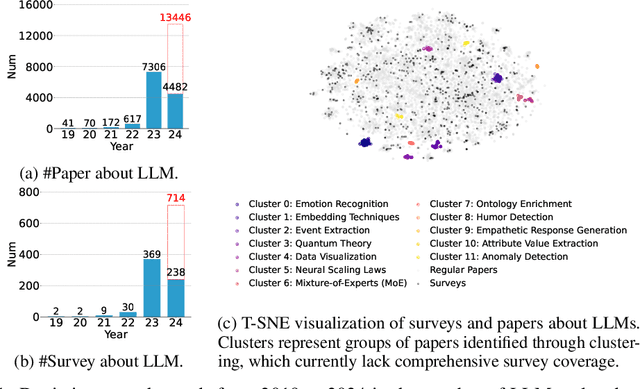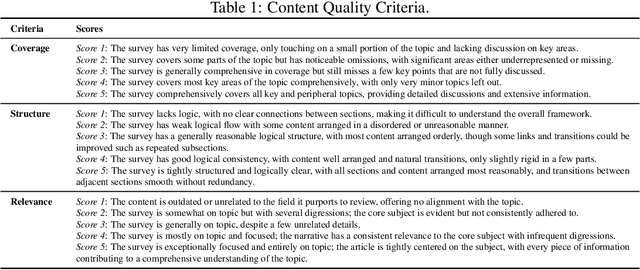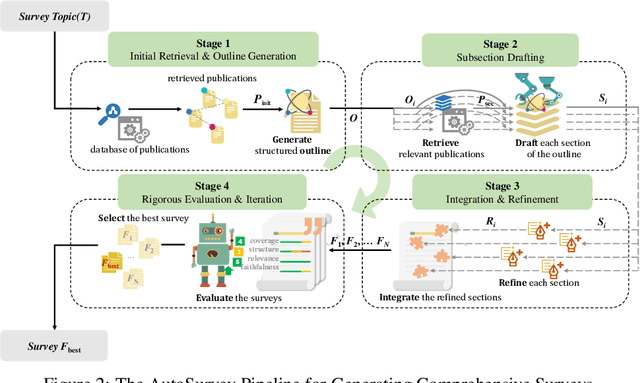Wenjin Yao
AutoSurvey: Large Language Models Can Automatically Write Surveys
Jun 18, 2024



Abstract:This paper introduces AutoSurvey, a speedy and well-organized methodology for automating the creation of comprehensive literature surveys in rapidly evolving fields like artificial intelligence. Traditional survey paper creation faces challenges due to the vast volume and complexity of information, prompting the need for efficient survey methods. While large language models (LLMs) offer promise in automating this process, challenges such as context window limitations, parametric knowledge constraints, and the lack of evaluation benchmarks remain. AutoSurvey addresses these challenges through a systematic approach that involves initial retrieval and outline generation, subsection drafting by specialized LLMs, integration and refinement, and rigorous evaluation and iteration. Our contributions include a comprehensive solution to the survey problem, a reliable evaluation method, and experimental validation demonstrating AutoSurvey's effectiveness.We open our resources at \url{https://github.com/AutoSurveys/AutoSurvey}.
FreeEval: A Modular Framework for Trustworthy and Efficient Evaluation of Large Language Models
Apr 09, 2024



Abstract:The rapid development of large language model (LLM) evaluation methodologies and datasets has led to a profound challenge: integrating state-of-the-art evaluation techniques cost-effectively while ensuring reliability, reproducibility, and efficiency. Currently, there is a notable absence of a unified and adaptable framework that seamlessly integrates various evaluation approaches. Moreover, the reliability of evaluation findings is often questionable due to potential data contamination, with the evaluation efficiency commonly overlooked when facing the substantial costs associated with LLM inference. In response to these challenges, we introduce FreeEval, a modular and scalable framework crafted to enable trustworthy and efficient automatic evaluations of LLMs. Firstly, FreeEval's unified abstractions simplify the integration and improve the transparency of diverse evaluation methodologies, encompassing dynamic evaluation that demand sophisticated LLM interactions. Secondly, the framework integrates meta-evaluation techniques like human evaluation and data contamination detection, which, along with dynamic evaluation modules in the platform, enhance the fairness of the evaluation outcomes. Lastly, FreeEval is designed with a high-performance infrastructure, including distributed computation and caching strategies, enabling extensive evaluations across multi-node, multi-GPU clusters for open-source and proprietary LLMs.
KIEval: A Knowledge-grounded Interactive Evaluation Framework for Large Language Models
Feb 23, 2024Abstract:Automatic evaluation methods for large language models (LLMs) are hindered by data contamination, leading to inflated assessments of their effectiveness. Existing strategies, which aim to detect contaminated texts, focus on quantifying contamination status instead of accurately gauging model performance. In this paper, we introduce KIEval, a Knowledge-grounded Interactive Evaluation framework, which incorporates an LLM-powered "interactor" role for the first time to accomplish a dynamic contamination-resilient evaluation. Starting with a question in a conventional LLM benchmark involving domain-specific knowledge, KIEval utilizes dynamically generated, multi-round, and knowledge-focused dialogues to determine whether a model's response is merely a recall of benchmark answers or demonstrates a deep comprehension to apply knowledge in more complex conversations. Extensive experiments on seven leading LLMs across five datasets validate KIEval's effectiveness and generalization. We also reveal that data contamination brings no contribution or even negative effect to models' real-world applicability and understanding, and existing contamination detection methods for LLMs can only identify contamination in pre-training but not during supervised fine-tuning.
 Add to Chrome
Add to Chrome Add to Firefox
Add to Firefox Add to Edge
Add to Edge